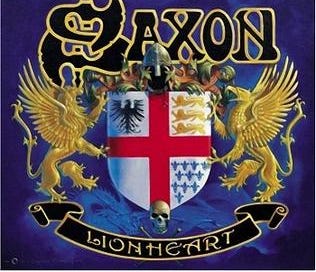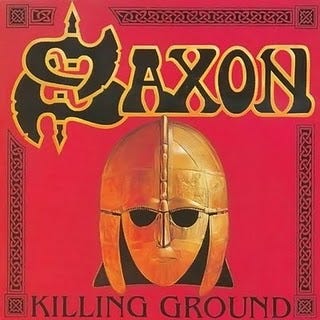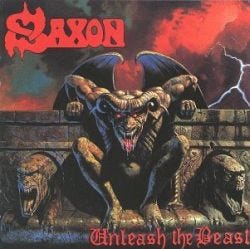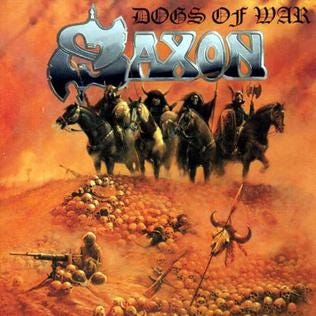Continuing our series ranking Saxon’s studio albums, we move on to the run of records generally described as “sure, why not?” or “eh, they’re fine I guess”. These are the ones that might have a dark horse favorite or two, but otherwise are mostly just serviceable. Which likely explains this section is full of material they put out during their incredibly prolific ‘90s and ‘00s run…
#19: Innocence is No Excuse (1985)
Saxon’s major label debut remains a point of contention for the band and their fanbase: some think of it as one that got away, while others write it off as a sellout. The retrospective view falls somewhere in the middle: largely written by Steve Dawson and Biff Byford, the group’s seventh album was hampered by gimmicky production from Simon Hanhart and a strangely lifeless opening number called “Rockin’ Again” that did exactly the opposite. But the singles were generally strong, working alongside “Everybody Up” to counteract the more tepid moves. Innocence is No Excuse did pander a bit, but it wasn’t nearly as pathetic or desperate as what Saxon would spew out over the next few years.
Rating: 3/5
#17: Call to Arms (2011)
Beginning with Solid Ball of Rock in 1990, Saxon committed to putting out new material every 2 or so years, ultimately rivalling Motӧrhead in terms of volume of output. This naturally had its drawbacks, as the sheer frequency of records meant that some would get lost in the shuffle, not to mention the issue of diminishing returns. And Call to Arms suffered from both, as it came and went fairly quickly without much notice, and not unfairly as it felt rote in spots. But this was also the era when every Saxon album could be counted on to offer its share of rockers and bangers, and this record did its job with fun tracks like “Afterburner” and “Hammer of the Gods”. There was a simplicity and ease to Call to Arms that kept it enjoyable enough even if there wasn’t much urgency on display.
Rating: 3/5
#16: Lionheart (2004)
It would be tempting to call Lionheart Saxon’s version of a power metal album, given that it was their one record to feature the well-traveled Jӧrg Michael on drums and “Witchfinder General” opened it with furious double-kick barrage. But this was really just another Saxon album, for better or worse, and wasn’t any heavier than any of their previous three platters. Then again, even though the group was releasing new material at a staggering clip, Lionheart was part of a generally consistent run for the band, and as such wasn’t the least bit embarrassing, as the aforementioned “Witchfinder General”, “Justice”, "English Man 'O' War" roared with vigor.
Rating: 3/5
#15: Killing Ground (2001)
Killing Ground’s opening title track surged with a power and force that suggested a heavier and more urgent album than what actually transpired. This wasn’t Saxon on autopilot, exactly, but there was enough mediocrity to make one wish the guys had taken more time, held on to the good tracks (besides “Killing Ground” and the solid cover of “In the Court of the Crimson King”, “Deeds of Glory” and “Running for the Border” were all strong) and combined them with the best moments from the subsequent Lionheart to make one killer record.
Rating: 3/5
#14: Unleash the Beast (1997)
The arrival of Doug Scarratt (replacing mustachioed founding guitarist Graham Oliver) didn’t mark a sea change, as Unleash the Beast was a logical continuation of Dogs of War. This could legitimately be called a more aggressive record for Saxon, and Kalle Trapp’s sizzling production emphasized the crunch in the guitars as well as the force of Nigel Glockler’s drumming. The writing however wasn’t always up to the task, and there was a little too much filler on what should’ve been a lean beast of a record. Still, the title track was a righteous banger (even with the cheeseball video), and “The Thin Red Line” was an underrated moody mini-epic.
Rating: 3/5
#13: Dogs of War (1995)
Although their march back from the abyss began 5 years earlier with Solid Ball of Rock, Dogs of War was the first Saxon record in almost 10 years to receive some form of distribution in America, and as such felt like the moment when the band could be taken seriously again. But while the rampaging title track, “Burning Wheels”, “The Great White Buffalo” and “Demolition Alley” all smoked, some of the dreaded laziness of old crept back into view on “Walking Through Tokyo” and the lame (albeit catchy) “Hold On”. Despite the album cover and aggression of those aforementioned songs, Dogs of War was actually a little less heavy than the two records that preceded it, and although it remains something of a minor favorite among the diehards, ultimately faded from recollection.
Rating: 3/5









